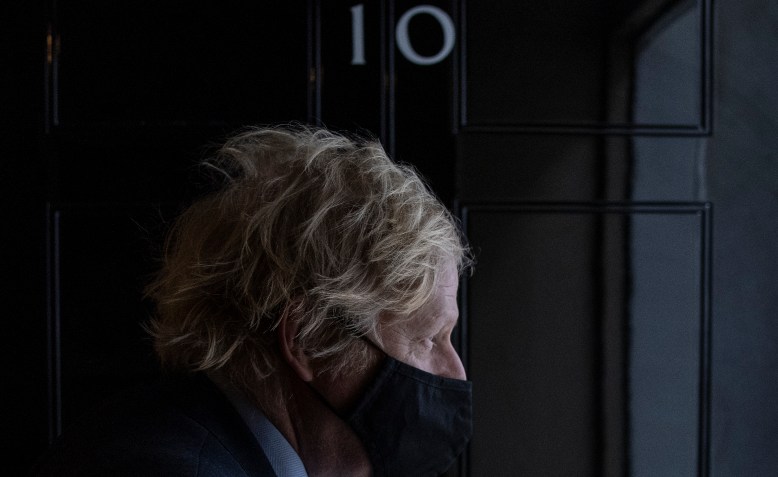 Boris Johnson, Number 10. Photo: Simon Dawson / No 10 Downing Street / Flickr / CC BY-NC-ND 2.0, license linked at bottom of article
Boris Johnson, Number 10. Photo: Simon Dawson / No 10 Downing Street / Flickr / CC BY-NC-ND 2.0, license linked at bottom of article
The success of the vaccine rollout has been despite capitalism, not because of it, argues Shabbir Lakha
Speaking to backbench Tory MPs, Boris Johnson reportedly remarked that the UK’s vaccine success is “because of capitalism, because of greed”. The comments were apparently made in jest and Johnson was quick to distance himself from them, but he went on to claim that the vaccine success is a result of big pharma wanting to “give good returns to shareholders.”
Priti Patel took it upon herself to come to his defence, saying, “the role of the free market, having absolutely a diversity in terms of different organisations that we’ve been able to work with on vaccinations, is incredibly important.”
There’s a couple of things worth noting here. The first is the helpful admission from the prime minister that capitalism is indeed greed. Johnson’s private schooling may have taught him otherwise, but for the majority of us, greed is not a positive trait. Some even call it a deadly sin. So thanks for clarifying that Boris.
Secondly is of course that he is completely wrong. Capitalist greed gave us the wilfully negligent agribusiness practices that spawned the virus in the first place, and the success of the vaccine rollout has been despite capitalism, not because of it. It is no coincidence that after a year of the government’s long list of failures and those of their mates who were awarded billions in contracts, that the vaccine rollout entrusted to the NHS has actually worked.
It’s a shameless ploy for the government to try and take credit for this, let alone praise capitalism for a socialised and collaborative effort – the very antithesis of capitalism. The scientific success of developing the vaccine in record time is also no thanks to big pharma or their shareholders.
Aside from the hundreds of millions of public money that is spent on scientific research and development which pharmaceutical companies rely on (even though the profit is entirely private), the monopoly of big pharma means that these giant pharmaceutical companies are the only ones capable of developing a vaccine. Because of their control of the manufacturing process from start to finish, the race for a vaccine is effectively limited entirely to them. The competition between these companies leads to inefficient wastage of resources and replication.
Precisely because of their priority of “good returns to shareholders”, big pharma is the primary reason why we didn’t have a vaccine sooner.
As soon as a virus dies down, the immediate market for a vaccine goes with it. When the Sars epidemic receded, all research into developing a vaccine was stopped. Scientists were close to vaccine that could have been adapted to newer strains of coronavirus in 2016 but they could not secure any funding to develop it. As Jason Schwartz of Yale School of Public Health said a year ago,
“Had we not set the Sars vaccine research programme aside, we would have had a lot more of this foundational work that we could apply to this new, closely related virus.”
The Ebola vaccine is another case in point. Ebola outbreaks have been largely limited to sub-Saharan Africa – in countries with very limited purchasing capability. This ceiling on potential profits is one of the main reasons why a new vaccine for a disease discovered in 1976 with periodic outbreaks and a 30% fatality rate was only made available in 2018.
The profits from medical research for a handful of people is the determining factor for whether millions of people will live or die. Even now, as the richest countries race to vaccinate their populations, they have secured a billion doses more than they need while some of the poorest countries are yet to receive any.
Big pharma maintains their patents on the vaccine depriving countries in the Global South the ability to develop their own vaccines. Instead, they have to rely on the ‘philanthropic’ scraps from the West’s table in the form of Covax. Under Covax provisions some of the poorest people in the world won’t see vaccines till 2023.
The recent ratcheting up of vaccine nationalism and threats of vaccine export bans by the EU could impact Covax provisions, like the seizing of AstraZeneca doses in Italy, some of which were destined to be exported under Covax.
In her defence of Johnson and pharmaceutical companies, Priti Patel jarringly said,
“I think that speaks to a great strength we have as a country. And linked to that, of course, look at our contributions to Covax, the international scheme, to get the vaccine supplies elsewhere and demonstrate that we are a very, very strong force for good internationally when it comes to vaccines, science and pharmaceutical development.”
Given the inversion of truth here, it is fitting that Patel would try to boast of Britain’s false internationalism on the same day that she announced international-law violating measures to clampdown on the rights of refugees.
The successes of the vaccine, from its development to its rollout, are a product of human ingenuity and collaboration. The flaws, from lack of preparedness to vaccine nationalism and the scandalous indifference to the developing world are the products of capitalism. Capitalist greed is what’s holding us back, not what’s saving us.
Join Revolution! May Day weekender in London
The world is changing fast. From tariffs and trade wars to the continuing genocide in Gaza to Starmer’s austerity 2.0.
Revolution! on Saturday 3 – Sunday 4 May brings together leading activists and authors to discuss the key questions of the moment and chart a strategy for the left.

